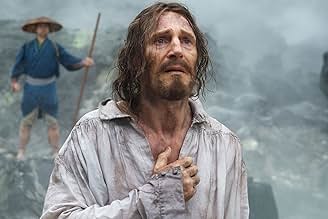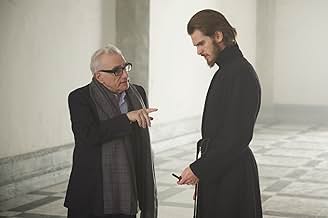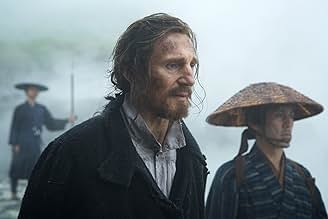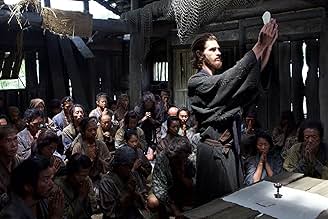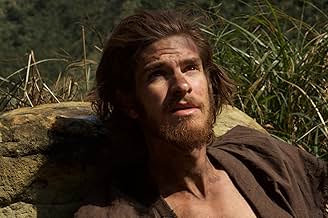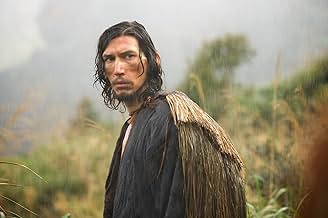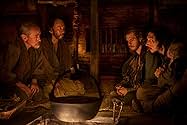Due preti gesuiti si recano in Giappone nel 17esimo secolo per trovare il proprio mentore e diffondere la parola di Dio.Due preti gesuiti si recano in Giappone nel 17esimo secolo per trovare il proprio mentore e diffondere la parola di Dio.Due preti gesuiti si recano in Giappone nel 17esimo secolo per trovare il proprio mentore e diffondere la parola di Dio.
- Regia
- Sceneggiatura
- Star
- Candidato a 1 Oscar
- 8 vittorie e 62 candidature totali
Issei Ogata
- Old Samurai
- (as Issey Ogata)
- …
Shin'ya Tsukamoto
- Mokichi
- (as Shinya Tsukamoto)
Yôsuke Kubozuka
- Kichijiro
- (as Yosuke Kubozuka)
Diego Calderón
- Prisoner Augustinian Friar #2
- (as Diego Calderon)
Panta
- Tomogi Villager #1 (Yohei)
- (as PANTA)
Recensioni in evidenza
'Silence' is exactly what you would expect from a Martin Scorsese film in that it is well-produced, written and shot with a strong storyline and engaging lead characters. There aren't many films that explore religion and faith as deeply as this one and there's no doubt that it is an intellectual, thought-provoking piece that Scorsese has created. It's also visually stunning - as a piece of filmmaking 'Silence' is difficult to fault.
It is, however, very easy to fault as a piece of entertainment. For all its technical merit, the truth is that this is an overly long, tediously slow and largely dull film that the average viewer will struggle to sit through. The pacing does it no favours and the near three-hour running length is excessive to say the least. It could have been condensed to closer to the two-hour mark without losing much at all from the storyline.
'Silence' is obviously more likely to appeal to those with religious/spiritual beliefs, and they would probably get a lot more out of this film than I did. A well-crafted film, but rather dull and unrewarding for the average viewer.
It is, however, very easy to fault as a piece of entertainment. For all its technical merit, the truth is that this is an overly long, tediously slow and largely dull film that the average viewer will struggle to sit through. The pacing does it no favours and the near three-hour running length is excessive to say the least. It could have been condensed to closer to the two-hour mark without losing much at all from the storyline.
'Silence' is obviously more likely to appeal to those with religious/spiritual beliefs, and they would probably get a lot more out of this film than I did. A well-crafted film, but rather dull and unrewarding for the average viewer.
It begins with a cacophonous medley of environmental sounds, such as crickets chirping, before cutting to absolute silence and the title. And then to a shot of severed heads. Perhaps this is Scorsese adding in some of his signature bits of artistic representations and violence. But what follows is an excruciating exercise in repetition, as faith is tested again and again for nearly three hours, with a relentlessness better reserved for succinct motifs, not heavy-handed, protracted lessons on religious dogmata.
"There's little peace for us now." The progress of spreading Christianity in Japan has been halted by persecution and destruction. The remaining padres have - along with their followers - been brutally murdered. Some even ask to be tortured to demonstrate their faith in God, but the end result is the same.
When a letter reaches Father Valignano (Ciaran Hinds), purporting that one of the strongest of all priests, Father Ferreira (Liam Neeson), has apostatized and taken up a Japanese wife, two young padres refuse to accept such an unequivocal falsity. Resolute in clearing his name, they determine to make the hazardous journey to Japan to find out the truth about Ferreira's whereabouts. Father Garrpe (Adam Driver) and Father Rodrigues (Andrew Garfield) were directly under his tutelage, and so procure a Japanese man, Kichijiro (Yosuke Kubozuka), living in Macao, to aid in their smuggling onto the island.
By 1640, Garrpe and Rodrigues are the last two priests to witness the aftermath of the 20 years of Jesuit persecution in Japan. They make their way to the tiny village of Tomogi before moving on to Goto, where remnants of Christian believers still secretly practice their faith. They must hide during the day and hold mass in the dead of night, always in fear of being found out by the Inquisitor (Issei Ogata), an elderly, somewhat comical man charged with seeking out and eradicating the perceived threat of Christianity.
"Silence" does exhibit stellar performances, especially when it comes to exceptional courage through unshakeable beliefs (Driver being far more convincing than Garfield, in appearance and speech). There are also opportunities for contrasts and fluctuations in adherence to such religious principles, particularly with Kichijiro, who comes to represent many of the failed ideologies mistranslated or misunderstood in proliferating a system so fundamentally alien to many of the formerly Buddhist inhabitants. Doubt also creeps in, as Garrpe grows impatient and Rodrigues questions the illusory habits of a deity that unexplainably remains absent in the most anguishing of times. The two priests, along with most of the villagers, are desperate for tangible signs of faith - signs that occasionally become more valuable than faith itself.
In this perpetual search for validation and proof of God's omniscience, there are numerous sequences of profound conviction, made more striking by the increasing pitifulness of the survivors and the escalation of tortures inflicted on those who refuse to renounce the invading religion. But, correspondingly, in this indulgent, overlong epic of potent morals, where the individualization of religious implications routinely trumps the bigger picture (along the lines of the infuriating yet purposeful justifications seen in "A Man for All Seasons"), there's fleeting entertainment value to be found. It's a historical lecture more than a moving examination of theological unity or human weakness, and surely a plodding series of reiterations on shaping spirituality through pain and fear. It's not quite the "priestsploitation" nonsense that it could have been, but it's nevertheless redundant, light on engaging drama, heavy on physical and psychological trials, and sparse on monumental ideas. Particularly with its finale, "Silence" attempts to think for the audience, so that they don't have to strain to uncover subtle genuineness; religious viewers will certainly interpret various sequences to a greater (or different) degree than those without perspectives comparable to the characters on screen.
"There's little peace for us now." The progress of spreading Christianity in Japan has been halted by persecution and destruction. The remaining padres have - along with their followers - been brutally murdered. Some even ask to be tortured to demonstrate their faith in God, but the end result is the same.
When a letter reaches Father Valignano (Ciaran Hinds), purporting that one of the strongest of all priests, Father Ferreira (Liam Neeson), has apostatized and taken up a Japanese wife, two young padres refuse to accept such an unequivocal falsity. Resolute in clearing his name, they determine to make the hazardous journey to Japan to find out the truth about Ferreira's whereabouts. Father Garrpe (Adam Driver) and Father Rodrigues (Andrew Garfield) were directly under his tutelage, and so procure a Japanese man, Kichijiro (Yosuke Kubozuka), living in Macao, to aid in their smuggling onto the island.
By 1640, Garrpe and Rodrigues are the last two priests to witness the aftermath of the 20 years of Jesuit persecution in Japan. They make their way to the tiny village of Tomogi before moving on to Goto, where remnants of Christian believers still secretly practice their faith. They must hide during the day and hold mass in the dead of night, always in fear of being found out by the Inquisitor (Issei Ogata), an elderly, somewhat comical man charged with seeking out and eradicating the perceived threat of Christianity.
"Silence" does exhibit stellar performances, especially when it comes to exceptional courage through unshakeable beliefs (Driver being far more convincing than Garfield, in appearance and speech). There are also opportunities for contrasts and fluctuations in adherence to such religious principles, particularly with Kichijiro, who comes to represent many of the failed ideologies mistranslated or misunderstood in proliferating a system so fundamentally alien to many of the formerly Buddhist inhabitants. Doubt also creeps in, as Garrpe grows impatient and Rodrigues questions the illusory habits of a deity that unexplainably remains absent in the most anguishing of times. The two priests, along with most of the villagers, are desperate for tangible signs of faith - signs that occasionally become more valuable than faith itself.
In this perpetual search for validation and proof of God's omniscience, there are numerous sequences of profound conviction, made more striking by the increasing pitifulness of the survivors and the escalation of tortures inflicted on those who refuse to renounce the invading religion. But, correspondingly, in this indulgent, overlong epic of potent morals, where the individualization of religious implications routinely trumps the bigger picture (along the lines of the infuriating yet purposeful justifications seen in "A Man for All Seasons"), there's fleeting entertainment value to be found. It's a historical lecture more than a moving examination of theological unity or human weakness, and surely a plodding series of reiterations on shaping spirituality through pain and fear. It's not quite the "priestsploitation" nonsense that it could have been, but it's nevertheless redundant, light on engaging drama, heavy on physical and psychological trials, and sparse on monumental ideas. Particularly with its finale, "Silence" attempts to think for the audience, so that they don't have to strain to uncover subtle genuineness; religious viewers will certainly interpret various sequences to a greater (or different) degree than those without perspectives comparable to the characters on screen.
- The Massie Twins
Silence is a difficult movie. The movie is set in Japan in the 17th century and deals with the role of Christianity at that time. From a historical point of view, it's quite interesting, especially because I haven't dealt with the subject matter shown before.
The various locations around Japan are really well chosen and staged in a contemporary way. Impressive images are shown as well. The movie also takes the necessary time to let what is shown take effect. As a consequence, the pace is correspondingly slow. On the one hand I find that good, on the other hand I miss the tension highlights. People are persecuted and tortured. This constant fear of being caught is communicated, but as a viewer you don't feel it at any time.
What I liked was the portrayal of Andrew Garfield's inner conflict. He starts to doubt God and he tries to find the right way back to God. But at the same time he doesn't want to show this doubting to the people, because they have it hard enough anyway. This whole process is well portrayed.
My main problem with the movie is that it couldn't catch me. I wasn't able to connect emotionally. It is thought-provoking and has good moments, but overall the movie was very drawn out.
The various locations around Japan are really well chosen and staged in a contemporary way. Impressive images are shown as well. The movie also takes the necessary time to let what is shown take effect. As a consequence, the pace is correspondingly slow. On the one hand I find that good, on the other hand I miss the tension highlights. People are persecuted and tortured. This constant fear of being caught is communicated, but as a viewer you don't feel it at any time.
What I liked was the portrayal of Andrew Garfield's inner conflict. He starts to doubt God and he tries to find the right way back to God. But at the same time he doesn't want to show this doubting to the people, because they have it hard enough anyway. This whole process is well portrayed.
My main problem with the movie is that it couldn't catch me. I wasn't able to connect emotionally. It is thought-provoking and has good moments, but overall the movie was very drawn out.
With regards to Martin Scorsese's SILENCE, let me just put it this way, I saw Scorsese's 1988's "The Last Temptation Of Christ," back when I was in college, as you know that film was also an adaptation, and I thought it was pure masterpiece just in terms of its themes because whether or not you'd want to argue that perhaps that some of the approach may have been sacrilegious or religiously inconsiderate, if you will, to me it was about wondering the what if's and whether or not doubt has any footing in order for faith to grow. To a certain extent, SILENCE conveys something similar.
Based on Shusaku Endo's novel, SILENCE is about two Jesuit missionaries who travel to Japan because they have heard that their mentor, Father Ferreira (Liam Neeson) has publicly denounced God. At the time, Christianity was outlawed in Japan, so in their search for their missing mentor, they endure torture, suffering, and the ultimate test of faith.
In a way you could say that SILENCE is Martin Scorsese's way of paying respect to the legendary filmmaker Akira Kurosawa especially for us fans who grew up watching old time Japan's samurai classics, although SILENCE is not action-driven obviously, but the authoritarian rule depicted in this film is definitely something that's culturally based on that particular era.
From technical standpoint, SILENCE is as rich and complex as the story itself, even the violence is done in a graphic yet artistic manner. Because the story is told through Andrew Garfield's Father Rodrigues' perspective, you'll find some of the shots from inside his prison cell, looking out, with the frame being in between the wooden bars, to be quite engrossing. It makes the tension all the more real because your mind just keeps racing, you don't know how much more gruesome it would get. Odd to say this but it sort of becomes a point of anticipation, it's as if every other half-hour or so, you know some Christians are going to get tortured and so you're just bracing for impact. Martin Scorsese's ever-so-reliable high standard quality filmmaking is present through and through, so there's no disappointing you there.
After being religious and full of conviction in "Hacksaw Ridge" as a Seventh-Day Adventist, actor Andrew Garfield becomes religious and full of conviction again, this time in "Silence" and what's interesting is that both films feature Japanese people. All that aside, this is yet another evidence of Garfield's commitment to his work, the same goes for Adam Driver and Liam Neeson who not only went through physical changes, you actually feel a bit concerned for their health, but that conviction is shown in their eyes. It's amazing to see how this former Spider-Man quickly this powerful force. The Japanese actors are equally outstanding, especially Issey Ogata whose performance has his own flamboyant way of being ruthless.
This is Scorsese's long passion project, he had been wanting to do this film for years, but the question remains, and those of you who've watched the film are probably wondering it as well. And my answer is no, I don't think SILENCE means to demonize Buddhism. If this film is Scorsese's way of promoting Christianity, then that is his prerogative. But throughout mankind's history, there had been many cases in many lands where the majority religion, whatever religion that maybe, persecutes the minority religion because they view them as a dangerous threat; a symbol of a potential takeover. Inquisitions have happened everywhere. Which leads me back to what I said earlier about how SILENCE reminds me a lot of "The Last Temptation Of Christ," we see men who are supposed to be like rocks, seemingly falter and start to question their faith, but perhaps questioning your faith is one way of reaffirming it. Liam Neeson's character in this film has a counter argument to Andrew Garfield's Rodrigues and he may make a bit of sense if you see it from his version of truth.
-- Rama's Screen --
Based on Shusaku Endo's novel, SILENCE is about two Jesuit missionaries who travel to Japan because they have heard that their mentor, Father Ferreira (Liam Neeson) has publicly denounced God. At the time, Christianity was outlawed in Japan, so in their search for their missing mentor, they endure torture, suffering, and the ultimate test of faith.
In a way you could say that SILENCE is Martin Scorsese's way of paying respect to the legendary filmmaker Akira Kurosawa especially for us fans who grew up watching old time Japan's samurai classics, although SILENCE is not action-driven obviously, but the authoritarian rule depicted in this film is definitely something that's culturally based on that particular era.
From technical standpoint, SILENCE is as rich and complex as the story itself, even the violence is done in a graphic yet artistic manner. Because the story is told through Andrew Garfield's Father Rodrigues' perspective, you'll find some of the shots from inside his prison cell, looking out, with the frame being in between the wooden bars, to be quite engrossing. It makes the tension all the more real because your mind just keeps racing, you don't know how much more gruesome it would get. Odd to say this but it sort of becomes a point of anticipation, it's as if every other half-hour or so, you know some Christians are going to get tortured and so you're just bracing for impact. Martin Scorsese's ever-so-reliable high standard quality filmmaking is present through and through, so there's no disappointing you there.
After being religious and full of conviction in "Hacksaw Ridge" as a Seventh-Day Adventist, actor Andrew Garfield becomes religious and full of conviction again, this time in "Silence" and what's interesting is that both films feature Japanese people. All that aside, this is yet another evidence of Garfield's commitment to his work, the same goes for Adam Driver and Liam Neeson who not only went through physical changes, you actually feel a bit concerned for their health, but that conviction is shown in their eyes. It's amazing to see how this former Spider-Man quickly this powerful force. The Japanese actors are equally outstanding, especially Issey Ogata whose performance has his own flamboyant way of being ruthless.
This is Scorsese's long passion project, he had been wanting to do this film for years, but the question remains, and those of you who've watched the film are probably wondering it as well. And my answer is no, I don't think SILENCE means to demonize Buddhism. If this film is Scorsese's way of promoting Christianity, then that is his prerogative. But throughout mankind's history, there had been many cases in many lands where the majority religion, whatever religion that maybe, persecutes the minority religion because they view them as a dangerous threat; a symbol of a potential takeover. Inquisitions have happened everywhere. Which leads me back to what I said earlier about how SILENCE reminds me a lot of "The Last Temptation Of Christ," we see men who are supposed to be like rocks, seemingly falter and start to question their faith, but perhaps questioning your faith is one way of reaffirming it. Liam Neeson's character in this film has a counter argument to Andrew Garfield's Rodrigues and he may make a bit of sense if you see it from his version of truth.
-- Rama's Screen --
In the Seventeenth Century, in Portugal, the Portuguese Jesuit priests Sebastião Rodrigues (Andrew Garfield) and Francisco Garupe[ (Adam Driver) ask permission to Father Alessandro Valignano (Ciarán Hinds) to travel to Japan to investigate the rumors that their mentor Father Cristóvão Ferreira (Liam Neeson) had committed apostasy abandoning his Catholic faith after being tortured by the shogunate. They meet the alcoholic fisherman Kichijiro (Yosuke Kubozuka) that agrees to guide them to Japan. When they arrive at a small village, they learn that the Christians residents live hidden in caves since the Inquisitor kills any villager suspect to be Christian. Along the days, Rodrigues and Garupel propagate Catholicism among the villagers and try to find a lead to Ferreira. But when the Inquisitor arrives in the village with his men, the live of the residents and the priests will change.
"Silence" is a film directed by Martin Scorcese that shows how cruel a man can be. Based on historical facts, "Silence" show the powerful Shogunate defending their religion and culture against the European Catholicism that promises easy paradise to the suffered Japanese workers that has to work lot to pay the taxes and survive. The result is a good, but too long and tiresome film. My vote is seven.
Title (Brazil): "Silêncio" ("Silence")
"Silence" is a film directed by Martin Scorcese that shows how cruel a man can be. Based on historical facts, "Silence" show the powerful Shogunate defending their religion and culture against the European Catholicism that promises easy paradise to the suffered Japanese workers that has to work lot to pay the taxes and survive. The result is a good, but too long and tiresome film. My vote is seven.
Title (Brazil): "Silêncio" ("Silence")
What Scorsese Film Ranks Highest on IMDb?
What Scorsese Film Ranks Highest on IMDb?
Cinema legend Martin Scorsese has directed some of the most acclaimed films of all time. See how IMDb users rank all of his feature films as director.
Lo sapevi?
- QuizAdam Driver lost 50 pounds for the role; 30 before filming, and 20 during filming.
- BlooperIn the scene where Rodrigues and his Translator meet Garupe on the beach, Just after Garupe jumps into the ocean and starts to swim, The Translator is saying dialogue but his lips are not moving for most of the spoken line, and what is spoken does not match his lip movements.
- Curiosità sui creditiThere was no music during the closing credits. The music was replaced by the sounds of the sea, a storm and the sounds of nature. This is in keeping with the deep ties Japan has with nature.
- ConnessioniFeatured in Roeper's Reviews: Richard Roeper's Top 16 Films for 2016 (2016)
- Colonne sonoreFrancesco's Cosmic Beam Experience (live, Marina Del Rey)
Composed and performed by Francesco Lupica
I più visti
Accedi per valutare e creare un elenco di titoli salvati per ottenere consigli personalizzati
- How long is Silence?Powered by Alexa
Dettagli
Botteghino
- Budget
- 46.000.000 USD (previsto)
- Lordo Stati Uniti e Canada
- 7.100.177 USD
- Fine settimana di apertura Stati Uniti e Canada
- 130.880 USD
- 25 dic 2016
- Lordo in tutto il mondo
- 23.834.809 USD
- Tempo di esecuzione
- 2h 41min(161 min)
- Colore
- Mix di suoni
- Proporzioni
- 2.35 : 1
Contribuisci a questa pagina
Suggerisci una modifica o aggiungi i contenuti mancanti







